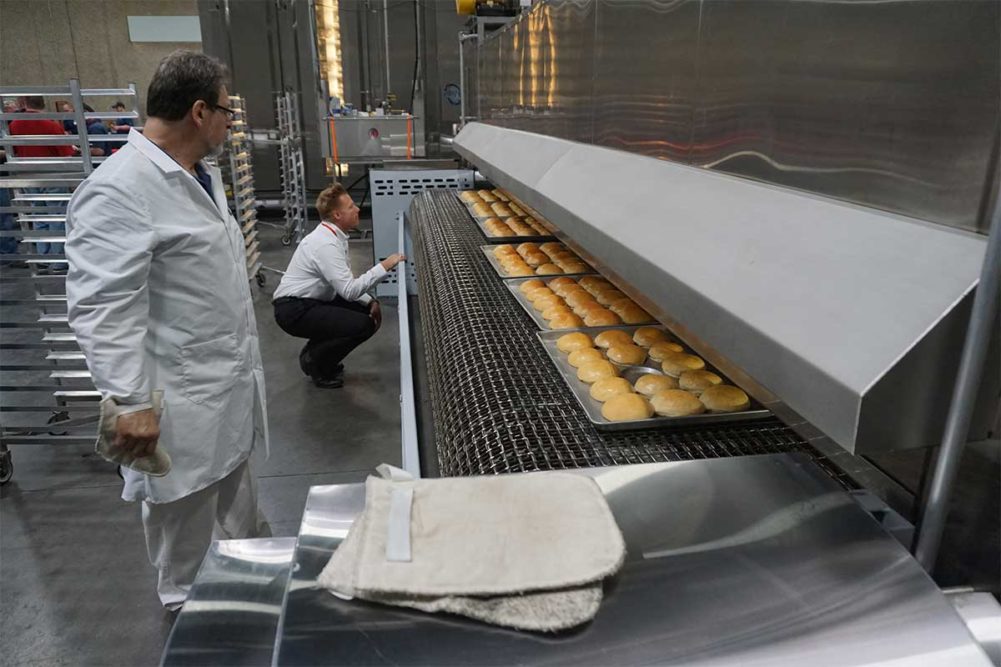Like a lot of engineers, Scott McCally has a story of how he found a career in the world of baking.
“I didn’t choose the bakery industry, it chose me,” said Mr. McCally, president of Auto-Bake Serpentine and Hinds-Bock, both part of Middleby Bakery.
Overall, Mr. McCally is now entering his 21st year as an engineer, 11 of them in the baking industry serving in roles such as thermal products manager, director of thermal engineering and vice president of engineering. Throughout his career, he has practiced structural, civil, electrical and, most predominantly, mechanical engineering with a specialization in thermal dynamics. Prior to entering the baking industry, he was the director of engineering for a commercial greenhouse systems manufacturer. There he built structures and automation systems for heating, cooling, irrigation, lighting and material handling.
“This experience was key to my initial role at Stewart Systems [another part of Middleby Bakery] as a thermal products engineer working with conveyorized ovens, proofers, coolers and trough systems,” he said.
Mr. McCally said had he realized what he knows now about the industry, he would’ve been interested from the very beginning. His passion now involves spreading the message that the baking industry has a lot to offer, especially for young professionals with technical degrees. He said companies must connect with them and get on their radar before they start looking for jobs after college.
“By the time I entered the baking industry, I was more than 10 years removed from college graduation,” he said. “Of course, everything that I did prior has been valuable in some way to prepare me for my roles, but for most engineers, once you begin your career in a certain industry, you are very unlikely to change.”
In his current position, Mr. McCally’s goal when working with bakers is to create the best solution for their processing needs, drawing on all of Middleby’s brands, including Stewart Systems, Baker Thermal Solutions and Spooner Vicars.
How does your experience outside of baking complement your current role?
As an ambitious young person, my first venture out into the world was to leave my very comfortable engineering job and start my own business designing and building custom homes, during one of the great building booms and busts of modern times, from 2000 to 2009. My dad, who was one of my great mentors, helped me to put this part of my career into perspective as, “the equivalent of a master’s degree in business,” which was comforting to hear and accept when I felt it was time to move on in 2006. It is really this experience that I draw from the most today in my current roles. Middleby brands are given immense entrepreneurial latitude, which appeals to the core of who I am.
Both of my parents were very successful entrepreneurs in two starkly different businesses; my dad, an expert commercial construction consultant considered the leading expert in the nation, and my mom, an Arabian horse trainer considered one of the top female trainers in the world. They both instilled in me from a very early age the value of hard work, determination, but most importantly the constant pursuit of excellence.
What are common challenges when starting up a new oven?
They involve integrating with upstream and downstream equipment, most commonly working to balance capacity. This includes adjusting speeds and metering conveyors to properly accumulate and feed pans continuously into and out of the oven. Ideally, the oven should remain full at all times.
Also, tuning the oven for the product by working with production and quality assurance bakery staff to achieve all the desired characteristics by making small iterative oven adjustments while running a steady product load.
Finally, operator understanding. This includes proper pre-commissioning training, and then it’s always best to shadow them for the first few days or weeks to make sure that they develop confidence and demonstrate their understanding before going solo.
What steps can bakers take to prepare their bakeries for a new oven and ensure the installation is a success?
Ask the manufacturer to offer an operator and maintenance training program that extends beyond the first few days or weeks. For a new Auto-Bake customer, we include one visit every quarter for the first year of operation. We find that we get deeper and better questions a few months after commissioning. It’s likely something we trained on, but it didn’t stick like we thought. It’s not because we are bad trainers or bakeries have slow learners. For unique equipment like Auto-Bake, it’s almost like the trainer is speaking a new language at times.
Also, if adding a new oven or line into a live production environment, quarantine the work areas and ensure proper ingress and egress for people, equipment and tools. Designate the proper resource to integrate the system together. And buy or consign the spare parts from the manufacturer, especially the catastrophic spares. These are long lead items that if they fail, the line stops producing and making money for you. This is not a question of warranty but of availability.






